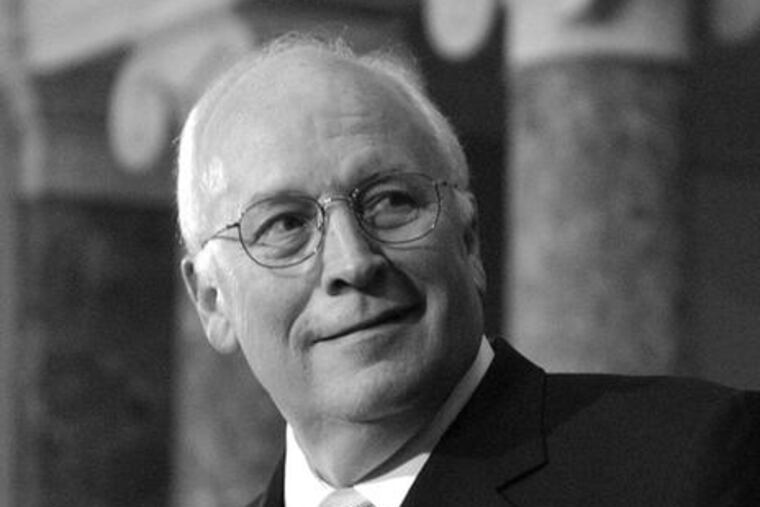By exerting influence early, he averted post-9/11 attacks
Between now and Jan. 20, expect a steady stream of reflections about President Bush's legacy. Such commentary is normal when a presidency draws to a close. But the end of the current administration also provides the occasion for an assessment of Vice Pres

Paul Mirengoff is a lawyer and a principal blogger of Powerline.com
Between now and Jan. 20, expect a steady stream of reflections about President Bush's legacy. Such commentary is normal when a presidency draws to a close. But the end of the current administration also provides the occasion for an assessment of Vice President Cheney's legacy, and this is unusual. I recall no such ruminations on the vice presidencies of Walter Mondale, George H.W. Bush, or Al Gore, all of whom, unlike Cheney, left office without having retired from politics.
How one assesses this vice presidency depends on how one views the policies pursued by President Bush during his first term, when Cheney's influence was at its apex. In particular, it depends on how one views the response to the attacks of Sept. 11, 2001.
Barton Gellman, in his book Angler: The Cheney Vice Presidency, provides a path to a less ideologically driven assessment. Gellman plainly is no fan of the policies Cheney advocated, but his focus is on the way he says Cheney was able to impose them.
Gellman argues that Cheney broke "the rules of good process" by, at times, "cutting out" the president's key advisers on important decisions and that Cheney's aggressive tactics caused him to lose influence in Bush's second term. Serving up something of a morality play, Gellman writes: "Cheney had disturbed the proportions of things, overleaping customary bounds. . . . Nemesis [the Greek goddess of retribution] arrived to knock him down."
If Gellman's reporting is correct, Bush did make some important decisions urged by Cheney without having talked to key advisers who held dissenting views. But the president has the absolute ability to consult with anyone he wants; the vice president has no authority to cut people out. Thus, if anyone broke "the rules of good process," it was Bush.
The president did so, presumably, because he had great faith in his vice president's judgment. After all, Cheney had been secretary of Defense, White House chief of staff, CEO of a large energy-related company, and an influential member of Congress.
Moreover, the policies Cheney promoted must have made great sense to the president. In particular, Cheney's advocacy of aggressive measures in response to 9/11 probably sold itself. In Bush's second term, when Cheney's views stopped seeming quite so self-evident, the president became more inclined to consult with others. This doesn't sound like bad process.
There is also a certain naivete to Gellman's discussion of bureaucratic battles in Washington, where infighting is an art form. To understand the milieu in which Cheney operated, I recommend War and Decision, by former Undersecretary of Defense Douglas Feith. Feith's book shows, for example, how the State Department implemented its own plan for post-invasion Iraq even though Bush had signed off on a different plan. In this context, Cheney's maneuvering can be viewed simply as one strategist usually (but not always) outwitting other masters of the same game.
Gellman suggests, however, that through his tactics, Cheney unleashed a reaction that caused his power to diminish and thus ultimately outwitted himself. More likely, any diminution in the vice president's influence resulted from facts on the ground in Iraq. In any event, I think that Cheney gets the last laugh.
By exerting maximum influence early in the war on terrorism, Cheney set its course. He may have lost influence after we smashed plans for follow-up attacks after 9/11, inflicted huge setbacks on al-Qaeda, toppled Saddam Hussein, and set out the general parameters of the war on terrorism. But Cheney might well consider these accomplishments a legacy of which he can be proud, and more of a legacy than any other vice president, and many presidents, can claim.
For me, it's not a close call. As my blog partner John Hinderaker has pointed out, after a stream of attacks throughout the 1990s and the early years of this decade, there were no successful attacks inside the United States or (wars aside) against American interests abroad from 2004 to today, unless one counts the recent attack in Mumbai.
Our success against terrorism did not occur by accident. For example, as Thomas Joscelyn, the senior editor of the Web site Long War Journal, persuasively argues, following 9/11, high-value detainees gave up critical lifesaving information during their interrogations. These interrogations were successful because the administration came up with rules under which, without suffering real injury, those who had plotted to kill us divulged their secrets.
If our tactics have reduced our popularity abroad, our newly elected leader can probably remedy any damage. The loss of life from successful terrorist attacks could not have been remedied.
Protection of our homeland and preservation of innocent American lives form the core of the Cheney legacy.